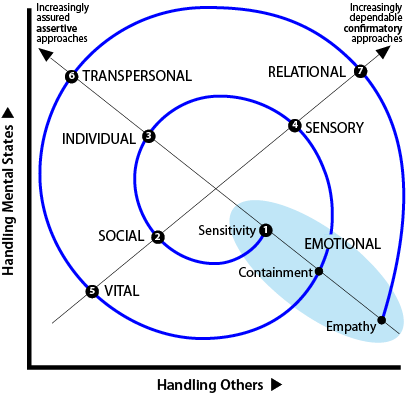Emotional Maturity
Individuation v Individualization
Emotional maturity involves at least two distinct processes, individuation and a .

-
Individuation: In conventional psychology and in psychodynamic psychotherapy, it is held that each person must develop an inter-dependent relation with others. This entails «separation» i.e. emerging and differentiating from an undifferentiated unconscious fusion with the environment, originally the mother. Individuation involves integration of many aspects of over a lifetime.
 Erikson's Stages
Erikson's Stages -
: In any given milieu, a person must develop a sufficiently strong that supports an and permits effective social functioning. This is an immediate matter arising when you find yourself in a social environment with people who have or seek influence over you, but do not know you.
The degree of strength required varies for each person and each milieu. So there is no absolute or pre-specified requirement as proposed above for individuation. There is only a minimum: If your milieu changes significantly, then your features may need to be re-defined and re-strengthened starting from that minimum.
 Examples:
Examples:
Many of the features associated with a are not commonly regarded as part of «emotional maturity» e.g. joining groups, humanitarian attitudes. Such factors are, however, commonly included within the notion of «personal maturity».
With the focus on emotionality as just one part of a person, changes within the ellipse are maturational.
Emotional Mode Ellipse
The features of emotionality that enable a show a progressive development through the two Cycles.
At the outset, is associated with a desire for approval that is obtained via selected confidantes who are willing to be recipients for outpourings of feelings. Effectiveness is based on compartmentalizing feelings.
As is pursued, emotionality is:
- reduced in by norms and needs of group life that encourage suppression of feelings, then
- withheld in by self-consciousness and a concern for privacy,
and finally - channeled in by ritual conviviality and the enjoyment of events with companions.
The end result is that sensitivity remains but emotions become contained rather than splashed about or dumped indiscriminately. values therefore adjust and lead to stability.![]() More on μ1 changes:
More on μ1 changes:
Well-being is increasingly brought under personal control during . Initially well-being depends on external approval () or social acceptance (), but then it is provided by self-respect () and sensory gratification (). The end result is that a person feels good in life within a comfort zone. Any movement or threat of movement outside a comfort zone naturally leads to anxiety and inhibition.
commences when maintaining comfort is less of a priority than self-actualization. Sensitivity with containment of emotions then allows a person to:
- select and rise to challenges (),
- appreciate ultimate values and sustain a humane attitude (), and
- cultivate meaningful friendships ().
The end result is that is now habitually used in the service of others via . values are now rather sophisticated.![]() More on μ1 changes
More on μ1 changes
The importance of for emotional intelligence tends to be overshadowed by the way it manifests in . This undeveloped is regarded as immature ('unintelligent') because it is so changeable, so seemingly needy or dependent, and so prone to egocentric outbursts.
is not a form of mental illness that requires or can benefit from therapy. A healthy person who attends a psychotherapist because emotionality and neediness are disliked is simply paying for a confidante with whom to ventilate feelings. Treatment here cannot be curative, but it may palliate painful emotional states.
The alternative to maturing properly is to inhibit feelings and suppress sensitivity. This can be done psychologically or with alcohol and drugs. Because a based on is essential to relate and work, the result is dysfunction. This suppression or distortion of the is a dysfunction that can benefit from therapy.
Dysfunction may show up as uncontrolled anger or proneness to violence, Personal relationships take the form of role-playing in which interactions are almost like scripts. The phenomenon was well captured by Eric Berne in his Games People Play, and has been labeled «object narcissism» in my psychoanalytic writings.
-
Back to Review.
Originally posted: 7-Jan-2016. Last amended 24-Jun-2016.
